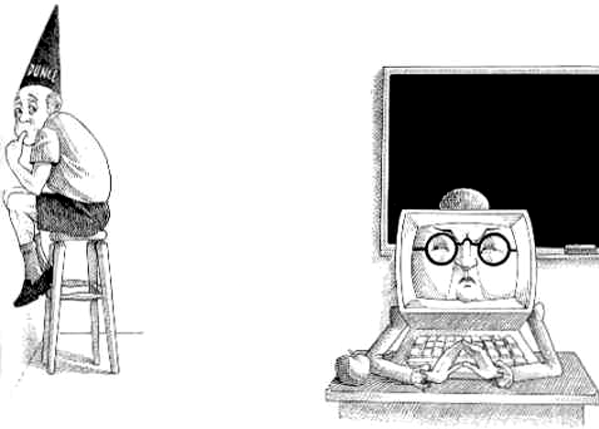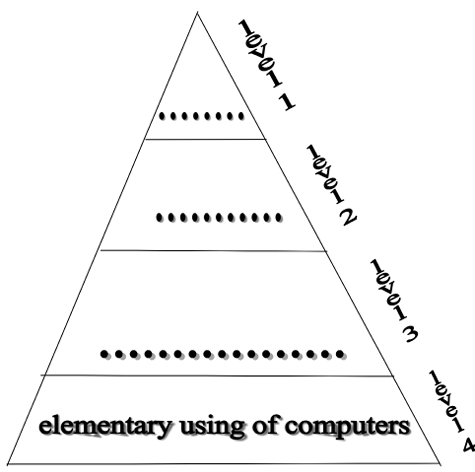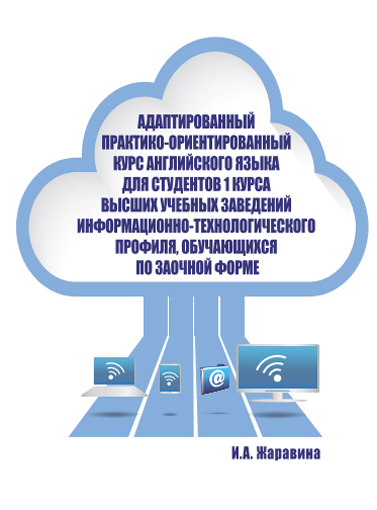
Научная электронная библиотека
Монографии, изданные в издательстве Российской Академии Естествознания
Unit 5. Are you computer literate?

If you are reading this, you have some hands-on computer experience48.
In most places of business, a computer is standard. In the bank they use computers to look up your account information. They use computers in the auto repair shop to assess your car49. You can’t find books in the library by looking in a card catalog — you must use a computerized database. Doctors’ offices utilize computers to store patient information. The point is this — no matter where you find employment, there is a good chance a computer will be a basic tool you will have to use. It is in your best interests to start off50 computer literate. In the whole computer literacy is the ability to use computers to perform a variety of tasks.
But in fact computer literacy comprises 3 aspects: awareness, knowledge and interaction. Awareness means being familiar with importance, versatility51, pervasiveness52 and potential of computers in fostering good/evil53.
Knowledge is information about what computer is and how it works. It includes technical jargon.
Interaction is practicing on computer. It is ability to use computer for some simple applications.
Computer literacy is becoming fundamental for the learning process. The “information age” perhaps best describes the twentieth century; the twenty-first century can be described as the “information processing age”. A wide variety of computer skills is useful and, in some cases required. It is an essential part of college learning and employment for most individuals. It will help you get a job and it will help you advance in your career.
Computer literacy does not mean you need to know how to use every single piece of software you may encounter54. It does not mean you need to know how to write programs for network computers. You just need to know some basics — how to save and open a file, how to use a word processing program, and how to send and receive email — for starters55.
But not for everyone “computer literacy” means the same. People engaged in computer engineering claim, that knowing how computers work and operate is no less valuable component of computer literacy.
Really, there is a wide range of skills covering levels of computer literacy from elementary use to programming and advanced problem solving.
People in office jobs that require them to use a computer every single day often have computer literacy levels far below what should be required. So many companies only consider computer literacy as an afterthought56 when hiring new staff which begs the question: “If they had run some kind of computer literacy test prior to hiring people57 how much more productive would the staff and, in turn, the company be?”
Test tasks could be as simple as the following:
● Correctly start up, log on to and shutdown the computer.
● Copy and paste a file into a pre-determined folder. Repeat with
multiple files.
● Re-name a file in a pre-determined folder.
● Minimize, maximize and re-size a window.
● Save a document from a Microsoft Office application into a pre-determined folder and save another copy with a different name somewhere else. (Demonstrating an understanding of “Save” and “Save as…”)
● Print a Microsoft Office document to a pre-determined printer.
● Send an e-mail with an attachment.
● Open a web browser and navigate to a pre-determined website.
● Copy and paste text into a document or e-mail.
● Switch between open applications.
● Connect to a wireless network (if this will be a common task in the applicant’s role, i.e. if they are going to be a mobile/laptop user)
● Identify a USB port.
It should take no longer than58 10 minutes to run through that test but the insight it will provide will be invaluable. All the tasks in that list are things the average 12 year old would be able to do without much of a problem. People with good IT skills will be able to get the jobs they deserve and companies will get efficient, productive staff. Changes or advances in the IT infrastructure would be a lot less painful and would take less time. IT departments would be free to concentrate on their core responsibilities rather than endure hours of hand-holding59.
Notes to the text:
48. hands-on experience – практический опыт;
49. to assess a car – оценивать машину;
50. to start off – начинать;
51. versatility – многосторонность;
52. pervasiveness – распространённость;
53. potential of computers in fostering good/evil – потенциал компьютеров в содействии добру / злу;
54. to encounter – столкнуться;
55. starters – начинающие;
56. afterthought – нечто кажущееся второстепенным, на которое обращаешь внимание слишком поздно;
57. prior to hiring people – прежде чем нанимать людей;
58. It should take no longer than… – обычно не занимает (времени) более чем… (Should в 3 л. ед.ч. используется в данном контексте для выражения регулярного, повторяющегося действия)
59. endure hours of hand-holding – зд.: постоянно консультировать персонал по вопросам, связанным с использованием компьютера.
Tasks for the text:
1. Put the necessary word into the sentence:
1) There is a wide range of ... covering levels of computer literacy.
2) People in office jobs have computer literacy levels far … what should be required.
3) Computer literacy is … to use computers to perform a variety of tasks.
4) Many companies … computer literacy as an afterthought when hiring new staff.
5) To run through … it should take no longer than 10 minutes.
6) Being familiar with importance, versatility, pervasiveness and potential of computers in fostering good/evil … awareness.
7) The average 12 year old would be able to do all … in that list without much of a problem.
8) People with good … skills will be able to get the jobs they deserve.
2. Complete the sentences using words from the text or words with the appropriate meaning:
1) To start off computer literate is.….
2) Computer literacy will help you ...
3) To know some basics means to save and open a file, to use a word processing program, and to …
4) The twenty-first century can be described as.…
5) There are 3 aspects of computer literacy: ...
6) No less valuable component of computer literacy is....
7) People in office jobs have computer literacy levels ...
8) Computer literacy is fundamental for …
3. Say the following in other words:
1) to beg a question;
2) to be familiar with;
3) a wide range of;
4) endure hours of hand-holding;
5) information age;
6) “information processing” age;
7) a variety of;
8) an essential part of.
4. Match the words that are synonymous and can be used instead of each other from two columns:
|
1 |
staff |
step |
|
2 |
scholarship |
records |
|
3 |
experience |
scope |
|
4 |
level |
work team |
|
5 |
range |
ability |
|
6 |
skill |
awareness |
|
7 |
tool |
duty |
|
8 |
database |
device |
|
9 |
responsibility |
knowledge |
|
10 |
insight |
practice |
5. Complete the list of activities you can do/ cannot do about the computer. Then test yourself to define how much you are computer literate. Tick if you can do it:
|
Number |
Kind of activity |
Place to tick / not to tick |
|
1. |
to switch computer on /off |
|
|
2. |
to rename files |
|
|
3. |
to save documents |
|
|
4. |
to print documents |
|
|
5. |
to send e-mail with attachments |
|
|
6. |
to copy and paste a text |
|
|
7. |
to connect to the Internet |
|
|
8. |
to open the web-browser and navigate in web-pages |
|
6. Fill in the diagram:
Levels of computer literacy

7. Write a job wanted (vacancy) announcement of a system administrator (sysadmin) specifying the skills an applicant is supposed to demonstrate at work.
Here is an example:
|
Vacancy |
Systems Administrator, Technology Services |
|
Job category |
Information technology |
|
Location |
Surgut, Tyumen region, Russia |
|
Work type |
permanent full-time |
|
Salary |
65 000 Р |
|
Description |
We are looking for a Systems Administrator with experience in Linux and CPanel. The Systems Administrator will be responsible for installing, supporting and maintaining servers used by the Product development Team. This includes optimizing, monitoring, troubleshooting and efficient operation of computer systems. |
|
Required qualifications |
– Bachelor’s degree in Computer Sciences or a related field; – At least 1-2 years of professional work experience; – Ability to work both as individual contributor and as part of a team; – Ability to learn quickly; – Good knowledge of English language; – Good communication skills; – Excellent documentation, good communication and written language skills; – Excellent problem solving and analysis skills. |
|
Additional notes |
To apply, please send your application form, covering letter and CV to ******@*******.ru |
|
Close date |
05 March 2014 |
